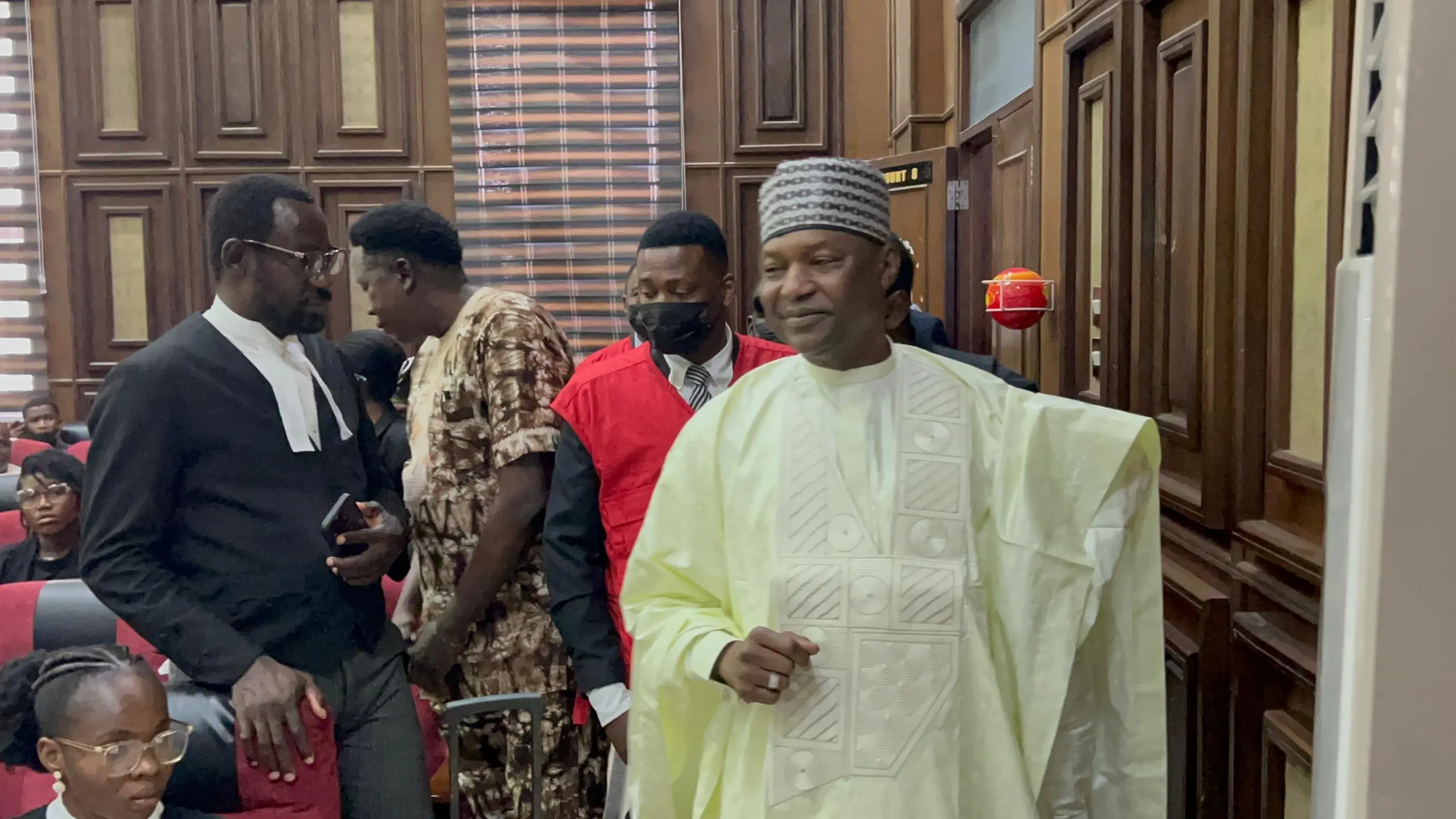General
Transparency International Suggests Ways to Tackle Illicit Financial Flows in Nigeria

By Adedapo Adesanya
Transparency International (TI) has revealed “a more efficient measures” to tackle the rate of illicit financial flows into Nigeria. The agency said out of the $50 billion in Africa, Nigeria accounts for 34 percent in the sum of $17 billion on the continent.
In collaboration with the Nigeria Financial Intelligence Unit (NFIU) and the Independent Corrupt Practices and Other Related Offences Commission, the bodies have called on the Central Bank of Nigeria (CBN) to enjoin all agencies under it to help tackle this problem.
The partnership called on the apex bank to regulate the operators of the Bureau de Change (BDCs) to help report all formal and informal cash transactions, including diaspora remittances, which account for large financial inflow to Nigeria.
In a statement released after the third anti-money laundering conference held in Abuja, TI and its collaborators discussed and recommended how to explore new measures in Nigeria’s anti-money laundering regime.
The conference, which was convened by the Civil Society Legislative Advocacy Centre (CISLAC) in collaboration with TI, ICPC, NFIU and CISLAC, issued a communiqué which was signed by the Corporate Affairs Commission, National Drug Law Enforcement Agency, Special Control Unit against Money Laundering, Code of Conduct Bureau and Securities and Exchange Commission (SEC), among others.
In the joint communiqué, the anti-corruption bodies maintained that illicit financial flows in Nigeria should be ended to attain the sustainable development goals (SDGs).
It added that suspicious financial transactions “are increasingly detected but not adequately investigated. Money launderers and their enablers in and outside Nigeria trade with impunity and without consequences.”
It equally observed that the BDCs were crucial in reporting formal and informal cash transactions, including diaspora remittances, which account for large financial inflow to Nigeria.
The communique, therefore, urged the CBN to improve its financial and regulatory oversight in combating money laundering and corruption through banks.
It explained the need for the CBN to improve its financial and regulatory oversight in combating money laundering and corruption through banks.
It added that the conversion of usable information into credible intelligence “should be improved by the anticorruption agencies
The communique also urged the National Assembly to prioritise the passage of all pending bills that will catalyse the anti-money laundering campaign especially the Companies and Allied Matters Act (CAMA).
“The National Assembly must assert greater supervision and control over the financial institutions and their oversight institutions including the anti-corruption agencies to investigate and to reduce the volume of illicit financial flows and their damage to the national development,” it added.
Further, President Muhammadu Buhari was enjoined to sign the Companies and Allied Matters Act (CAMA) to facilitate establishment of a beneficial ownership register accessible to the public by the Corporate Affairs Commission.
It was stated that despite improvement in reported suspicious transactions, the rate of prosecution, conviction and asset confiscations on money laundering charges remained disappointing in Nigeria and in Africa.
The communique then emphasised the need for all anti-corruption agencies in Nigeria and Africa to transit from manual to digital technology to fight money laundering which it said is more efficient and result oriented.
It was also said pre-election and election years had the highest number of suspicious transaction reports, saying there was an inseparable factor between money laundering and political parties.
It also observed that availability of reliable data is critical for effective anti-money laundering measures.
They recommend that relevant public and private organisations should measure their business practices against international benchmarks as set by Financial Action Task Force and other global standard setters.
“Declaration of assets owned by senior officials and Politically Exposed Persons as required by the Code of Conduct Act must be enhanced, data made public and suspicious wealth investigated by the law enforcement.
“There should be promotion of transparency and the involvement of civil society groups and citizens’ participation in the utilisation and management of confiscated and seized assets,” the comminique demanded.
General
NISO Attributes Electricity Woes to Inadequate Gas Supply

By Adedapo Adesanya
The Nigerian Independent System Operator (NISO) has attributed the poor power supply facing a considerable number of Nigerians to inadequate gas supply to thermal power plants.
Business Post reports that epileptic power supply has plagued consumers in Lagos, Oyo, Abuja, and Osun, among others, this month, leading to worries. Also, some businesses have recorded losses due to the epileptic power supply in their areas.
In a statement posted on its X handle, NISO disclosed that average available generation on the national grid currently stands at about 4,300 megawatts (MW), with the low output primarily attributed to gas supply constraints.
The system operator noted that thermal power plants, which account for the dominant share of Nigeria’s electricity generation mix, require an estimated 1,629.75 million standard cubic feet (MMSCF) of gas per day to operate at optimal capacity. However, as of February 23, 2026, actual gas supply to the plants was approximately 692.00 MMSCF per day.
The available supply represents less than 43 per cent of the daily gas requirement, resulting in constrained generation output and reduced electricity allocation to Distribution Companies (DisCos).
NISO, which independently manages the nation’s electricity grid, explained that any disruption or limitation in gas supply directly affects available generation capacity and overall grid output, given the heavy reliance on thermal plants.
It added that when total system generation drops significantly, the operator is compelled to implement load shedding across the network while dispatching available energy in line with allocation percentages approved under the Multi-Year Tariff Order (MYTO) framework of the Nigerian Electricity Regulatory Commission (NERC), to maintain grid stability and prevent system disturbances.
While expressing regret over the inconvenience to electricity consumers and market participants, NISO said it is working closely with relevant stakeholders to restore full energy allocation once gas supply improves and generation capacity returns to normal levels.
General
EFCC Re-Arraigns ex-AGF Malami, Wife, Son Over Alleged Money Laundering

By Adedapo Adesanya
The Economic and Financial Crimes Commission (EFCC) has re-arraigned former Attorney-General of the Federation (AGF), Mr Abubakar Malami (SAN), his wife, Mrs Asabe Bashir, and son, Mr Abdulaziz Malami, on money laundering charges.
They were brought before Justice Joyce Abdulmalik of the Federal High Court in Abuja, following the re-assignment of the case to the new trial judge.
Upon resumed hearing, EFCC’s lawyer, Mr Jibrin Okutepa (SAN), informed the court that the matter was scheduled for defendants’ re-arraignment.
“The matter is coming before your lordship this morning for the very first time. I will be applying for the plea of the defendants to be taken,” he said.
Mr Okutepa equally applied that the sums listed in Counts 11 and 12 be corrected to read N325 million instead of N325 billion for Count 11, and N120 million instead of N120 billion for Count 12.
When it was not opposed by the defence lawyer, Mr Joseph Daudu (SAN), Justice Abdulmalik granted the oral application by Mr Okutepa.
The defendants, however, pleaded not guilty to the 16 counts preferred against them by the anti-graft agency bordering on money laundering.
Justice Obiora Egwuatu had, on February 12, withdrawn from the case shortly after the civil case filed by the EFCC was brought to him.
The case was formerly before Justice Emeka Nwite, who sat as a vacation judge during the Christmas/New Year break.
After the vacation period, the CJ reassigned the cases to Justice Egwuatu, who had now recused himself, before it was reassigned to Justice Abdulmalik.
The former AGF, his wife, and son were earlier arraigned before Justice Nwite on December 30, 2025.
While Malami and his son were remanded at Kuje Correctional Centre, Asabe was remanded at Suleja Correctional Centre before they were admitted to N500 million bail each, on January 7, with two sureties each in the like sum.
General
INEC Shifts 2027 Presidential, N’Assembly Elections to January 16

By Adedapo Adesanya
Nigeria will hold next year’s presidential and National Assembly elections a month earlier than planned, after the Independent National Electoral Commission (INEC) revised the polling schedule.
The elections will be held on January 16, instead of the previously announced date of February 20, INEC said in an X post, signed by Mr Mohammed Kudu Haruna, National Commissioner and Chairman, Information and Voter Education Committee.
There were also changes to the Governorship and State Houses of Assembly elections initially fixed for Saturday, March 6 2027, in line with the Electoral Act, 2022, have now been moved to Saturday, February 6, 2027.
The electoral commission said the changes were caused by the enactment of the Electoral Act, 2026 and the repeal of the Electoral Act, 2022, which introduced adjustments to statutory timelines governing pre-election and electoral activities.
“The Commission reviewed and realigned the schedule to ensure compliance with the new legal framework,” it said.
INEC said party primaries (including resolution of disputes) will commence on April 23, 2026 and end on May 30, 2026, after which Presidential and National Assembly campaigns will begin on August 19, 2026, while Governorship and State Houses of Assembly campaigns will begin on September 9, 2026.
It noted that campaigns will end 24 hours before Election Day, and political parties have been advised to strictly adhere to the timelines.
INEC also stated it will enforce compliance with the law.
The electoral body also rescheduled the Osun Governorship election which was earlier scheduled for Saturday, August 8 2026, by a week to Saturday, August 15, 2026.
INEC noted that some activities regarding the Ekiti and Osun governorship elections have already been conducted, and the remaining activities will be implemented in accordance with the Electoral Act, 2026.
Speaking at a news briefing in Abuja two weeks ago, the chairman of INEC, Mr Joash Amupitan, expressed the readiness of the commission to conduct the polls next year.
The timetable issued by the organisation for the polls at the time came when the federal parliament had yet to transmit the amended electoral bill to President Bola Tinubu for assent.
Later that week, the Senate passed the electoral bill, reducing the notice of elections from 360 days to 180 days, while the transmission of results was mandated with a proviso.
-

 Feature/OPED6 years ago
Feature/OPED6 years agoDavos was Different this year
-
Travel/Tourism10 years ago
Lagos Seals Western Lodge Hotel In Ikorodu
-

 Showbiz3 years ago
Showbiz3 years agoEstranged Lover Releases Videos of Empress Njamah Bathing
-

 Banking8 years ago
Banking8 years agoSort Codes of GTBank Branches in Nigeria
-

 Economy3 years ago
Economy3 years agoSubsidy Removal: CNG at N130 Per Litre Cheaper Than Petrol—IPMAN
-

 Banking3 years ago
Banking3 years agoSort Codes of UBA Branches in Nigeria
-

 Banking3 years ago
Banking3 years agoFirst Bank Announces Planned Downtime
-

 Sports3 years ago
Sports3 years agoHighest Paid Nigerian Footballer – How Much Do Nigerian Footballers Earn












